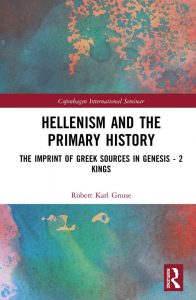Um artigo:
Greek Literature and the Primary History – By Robert Karl Gnuse – The Bible and Interpretation: June 2020
Os comentaristas observam há anos como os autores bíblicos podem ter usado textos gregos ou refletido o pensamento grego em seus escritos. Geralmente, essas observações foram relacionadas a obras bíblicas criadas após 300 a.C. Pensa-se especialmente no livro da Sabedoria, datado por volta de 50 a.C., que estava vagamente ligado à tradição filosófica platônica e frequentemente comparado aos escritos do autor judeu Fílon de Alexandria, que escreveu em grego. Os dois livros dos Macabeus foram ocasionalmente comparados com a historiografia gerada pelos gregos. Vários romances judeus foram discutidos, às vezes, em conexão com romances gregos. Qohélet foi associado ao estoicismo e epicurismo grego.
Nos últimos anos, no entanto, vários estudiosos dataram os livros bíblicos da História Primária (de Gênesis até 2 Reis) muito mais tarde. Assim, eles levantaram a possibilidade de que os autores desses livros estivessem familiarizados com textos em grego clássico até 300 a.C. e textos em grego helenístico após 300 a.C., e talvez até usassem alguns textos em grego para criar tramas nos livros da História Primária. Eles são frequentemente chamados de minimalistas e eles geralmente acreditam que a maior parte da narrativa bíblica não reflete a história real que aconteceu no período pré-exílico até 586 a.C. Esses minimalistas foram chamados também de Escola de Copenhague, porque os principais autores vêm da Universidade de Copenhague, embora algumas vezes professores da Inglaterra – incluindo a Universidade de Sheffield – estejam incluídos neles. Os minimalistas se dividem, nesta questão, em dois grupos. Alguns sugerem que Gênesis até 2 Reis surgiu principalmente no período persa (540-330 a.C.), enquanto outros apontam a era helenística, depois de 300 a.C., como a data de origem para a maior parte ou toda a História Primária.
A possibilidade de tal interface entre textos gregos e bíblicos no final do período pós-exílico foi levantada por vários autores. Trabalhos significativos foram escritos por autores que sugerem uma data bem mais recente para a literatura bíblica e a probabilidade de os textos serem narrativas ficcionais orientadas por perspectivas teológicas e a influência da literatura grega sobre os textos.
Sobre Robert Karl Gnuse e sobre esta proposta, leia também:
O Pentateuco e a OHDtr podem ter sido escritos na época helenística – Observatório Bíblico: 18/08/2018
Comentators have observed for years how biblical authors might have used Greek texts or reflected Greek thought in their writings. Generally, these observations were connected with biblical works authored after 300 BCE. One thinks especially of the Wisdom of Solomon, dated around 50 BCE, which was loosely connected to the Middle Platonic philosophical tradition and often compared to the writings of the Jewish author Philo, who wrote in Greek. The two books of Maccabees were occasionally compared with historiography generated by the Greeks. Various Jewish novels were sometimes discussed in connection with Greek novels. Koheleth was associated with Greek stoicism and epicureanism.
In recent years, however, a number of scholars have dated the biblical books in the Primary History (Genesis through 2 Kings) very late. Thus, they have raised the possibility that the authors of these books might have been very familiar with Classical Greek texts down to 300 BCE and Hellenistic Greek texts after 300 BCE, and perhaps they even used some Greek texts to craft plot-line and imagery in the books of the Primary History. They are often called “minimalists” for dating the biblical texts so late, and they usually believe that most of the biblical narrative does not reflect the actual history that happened in the pre-exilic period down to 586 BCE. These “minimalists” have been called the “Copenhagen School” because leading authors come from the University of Copenhagen, although sometimes faculty from England (including Sheffield University) are included with them. “Minimalists” also fall into two groups. Some suggest that Genesis through 2 Kings arose primarily in the Persian period (540-330 BCE), while others stress the Hellenistic era, after 300 BCE, as the time of origin for most or all of the Primary History.
The possibility for such an interface between Greek and biblical texts late in the post-exilic period was raised by several authors. Significant works have been written by authors who raise the larger questions of a later date for biblical literature: the likelihood that the texts are fictional narratives driven by theological perspectives and the influence of Greek literature upon the texts.
Um livro:
GNUSE, R. K. Hellenism and the Primary History: The Imprint of Greek Sources in Genesis – 2 Kings. Abingdon: Routledge, 2020, 216 p. – ISBN 9780367462468.
Esta coleção de ensaios procura demonstrar que muitos autores bíblicos usaram deliberadamente textos gregos clássicos e helenísticos como inspiração ao elaborar muitas das narrativas na História Primária.
Através de uma análise detalhada do texto, Gnuse sustenta que existem numerosos exemplos de clara influência da literatura clássica e helenística tardia. Colocando as obras bíblica e grega em paralelo, ele argumenta que há muitas semelhanças no tema básico, significado e detalhes, para que elas sejam explicadas por coincidência. Usando essas evidências, ele sugere que, embora grande parte do texto possa ser originária do período persa, grande parte de sua forma final provavelmente data da era helenística.
Com a ajuda de uma introdução original e um capítulo final, Gnuse reúne seus ensaios em uma coleção coerente pela primeira vez. O volume resultante oferece um recurso valioso para qualquer pessoa que trabalhe com a Bíblia Hebraica, bem como para aqueles que trabalham com o processo de helenização da Palestina.
This collection of essays seeks to demonstrate that many biblical authors deliberately used Classical and Hellenistic Greek texts for inspiration when crafting many of the  narratives in the Primary History.
narratives in the Primary History.
Through detailed analysis of the text, Gnuse contends that there are numerous examples of clear influence from late classical and Hellenistic literature. Deconstructing the biblical and Greek works in parallel, he argues that there are too many similarities in basic theme, meaning, and detail, for them to be accounted for by coincidence or shared ancient tropes. Using this evidence, he suggests that although much of the text may originate from the Persian period, large parts of its final form likely date from the Hellenistic era.
With the help of an original introduction and final chapter, Gnuse pulls his essays together into a coherent collection for the first time. The resultant volume offers a valuable resource for anyone working on the dating of the Hebrew Bible, as well as those working on Hellenism in the ancient Levant more broadly.
Table of Contents
Introduction: An Intellectual Odyssey
1. A Hellenistic First Testament: The Views of Minimalist Scholars
2. Spilt Water: Tales of David in II Sam 23:13-17 and of Alexander the Great in Arrian, Anabasis of Alexander 6.26.1-3
3. Abducted Wives: A Hellenistic Narrative in the Book of Judges?
4. From Prison to Prestige: The Hero who helps a King in Jewish and Greek Literature
5. Divine Messengers in Genesis 18-19 and Ovid
6. Greek Connections: Genesis 1-11 and the Poetry of Hesiod
7. Genesis 1-11 and the Greek Historiographers Hecataeus of Miletus and Herodotus of Halicarnassus
8. Heed Your Steeds: Achilles’ Horses and Balaam’s Donkey
9. Samson and Heracles Revisited
10. The Sacrificed Maiden: Iphigenia and Jephthah’s Daughter
11. The Maximalist/Minimalist Debate over Historical Memory in the Primary History of the Old Testament
